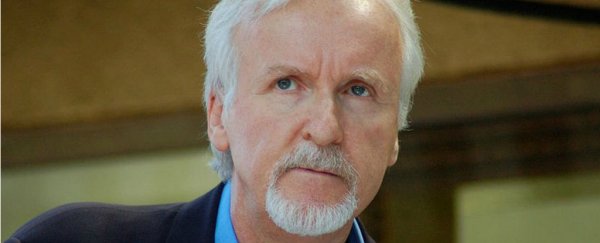Filmmaker and deep sea explorer James Cameron is seriously concerned about the future of our oceans.
Speaking to reporters in Sydney this week, the acclaimed director of Titanic issued a no-nonsense warning: unless human behavior changes, the Great Barrier Reef will soon become a wonder of the past.
"The heating, even a few degrees, can cause the symbiotic algae in coral to depart and coral bleach, and then it becomes an unhealthy reef system, and then it ultimately fails," he said.
"This is something that if we don't course correct with regards to the carbon we are dumping into the atmosphere, it's going to become an inevitability. The Great Barrier Reef will die, it's that simple."
As a deep sea explorer who has visited the wreckage of the Titanic no less than 11 times, Cameron knows more about ocean science than most celebrities.
In 2012, Cameron's submarine, The Challenger Deep, broke the surface of the Pacific, carrying the filmmaker back from the first ever solo descent to the ocean's deepest point: the Mariana Trench.
Now, Cameron is visiting Australia to launch a new Challenging the Deep exhibition at the Australian Maritime Museum in Sydney, an exhibit which features several of Cameron's scientific discoveries and achievements.
But while Cameron may be smitten with the deepest and darkest depths of the ocean, he told reporters in Sydney that he is most concerned by what is occurring on the surface.
"I think those deeper ecosystems have survived for millions of years, and will survive millions of years longer," he said.
"It's that thin skin of life up near the top of the ocean we need to put our focus on now.
"We need to think not about saving the ocean by going into the ocean more, but we need to think about saving the ocean by how we behave here on the land."
Cameron's warning comes shortly after the Australian government announced the single largest investment in the Great Barrier Reef, more than $500 million Australian dollars (or $379 million USD).
Nevertheless, some environmental activists are worried that the sum is too little, too late – especially given the Australian government's continued ties to the coal industry.
As a consequence of burning fossil fuels, climate change has led to unprecedented coral bleaching and ocean acidification, while burgeoning coastal development and fishing have only added to the reef's steady deterioration.
Between 1985 and 2012, human influences caused a 50 percent decline in coral cover. In addition, a 2016 survey revealed that 93 percent of the Great Barrier Reef has already been damaged by coral bleaching.
"The ocean has become the toilet of human civilisation," Cameron told reporters.
"Between our consumption from the ocean and our waste cycle into the ocean, we have pretty much condemned the ocean to a highly degraded state, if not utter doom if we don't acknowledge that and course correct."
Cameron's anxiety is not misplaced. An extensive report from earlier this year reveals that the 80,000-ton Great Pacific Garbage Patch is still growing.
Meanwhile, not even the deepest parts of the ocean are safe. A new study reveals there are almost 3,500 pieces of plastic and debris in the deepest parts of the ocean, including one, single-use plastic bag, found at a depth of 10,898 metres (35,754 ft) in the Mariana Trench.
Nor is Cameron hopeful for the future. Like many other scientists and environmental activists, Cameron is particularly worried that science denial will impede our ability to adapt to environmental challenges.
"I'm most fearful for the human proclivity for denial," Cameron told the Fast Company in a recent interview.
"The challenges that face us are really scientific challenges. We're turning our back on and politicizing inconvenient science, whether it's climate change, genetic research, species extinction, habitat loss, or ocean pollution.
"Science is our way through these problems."
